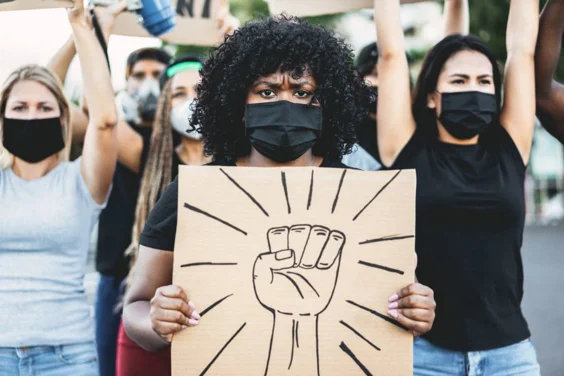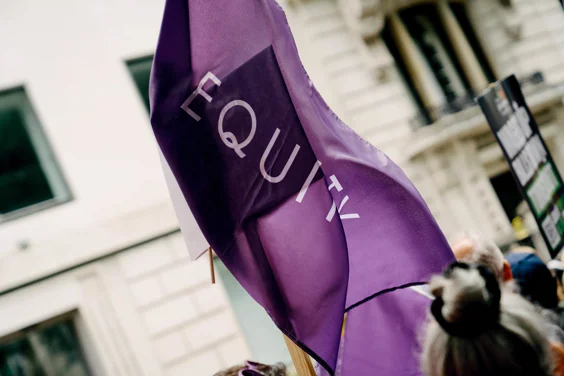On this page
Policy Statement
Equity’s primary role is to ensure that its members gain secure, well-paid work across the entertainment industry. Equity supports its members in gaining work which allows for authentic artistic expression, and which avoids any form of discrimination, exploitation or bias. Equity’s policy approach is to inform and educate its members across the entertainment sector on the phenomena of cultural appropriation, and how they may actively avoid this.
Equity does not seek to limit the range and type of work members undertake, and the union shall not seek to impose this policy stance on members. Instead, the role of this policy position is to raise awareness, understanding and promote good practice.
Equity considers good practice is for our members to be aware of any element of cultural appropriation and be respectful of this. If elements of another culture are used this should done respectfully and authentically wherever possible.
Equity’s approach:
• To encourage our members to reflect on the cultural dimensions of their work.
• To ask members to reflect upon whether their work may consciously or unconsciously draw upon or replicate aspects of the culture of ethnic or social groups other than their own.
• To promote the authentic and accurate portrayal of social and ethnic groups.
Cultural Appropriation in the Entertainment Industry
Cultural appropriation is the use of certain elements of another culture without recognition of this, nor any form of participation of the people who belong to that culture. Often a problem is that of members of a majority culture in a defined territory such as the UK appropriating that of a minority culture, and in doing so perpetuating myths and stereotypes.
In the entertainment industry this may include, for example, wearing costume, makeup or song which is drawn from the culture of a differing ethnic or social group than that of the performer. As such, a key concern is that of financial gain as a result of cultural appropriation, as well as the denial of work to members of minority cultures.
Whilst it may be practically difficult to involve members of the ethnic or social group concerned when developing performance work, the prevalence of cultural appropriation requires that performers, and allied workers, consider whether the source material of their work should be altered, or the originating culture be more consciously acknowledged and celebrated.
Where culture is defined as, “the arts and other manifestations of human intellectual achievement regarded collectively…the ideas, customs, artefacts and social behaviour of a particular people or society.
Source: Oxford English Dictionary (OED)
How to Avoid Cultural Appropriation
All workers in the creative industries can play a positive role by reflecting the source material of their work, and its impact on others. Sometimes a member of a majority culture may not recognise the harm of cultural appropriation until they are made aware of it. This is why Equity is asking its members to reflect on this guidance.
This guidance arises from Equity’s Variety, Circus and Entertainment Committee (VCEC), and is allied to the union’s broader work around authentic, positive portrayal across the entertainment industry.
A key issue of cultural appropriation is around intention. As such, Equity is asking its members to read and reflect upon the following questions:
- Are you taking something from a different cultural group as part of your work?
- Why are you doing this this? Is it because of genuine interest in that culture, or is this because you like the way that something looks?
- What is the source of the material? For material items such as artwork, was it made by someone from that culture? What does this item mean to them?
- How respectful is this to the culture? What would someone from that group feel about it?
Whilst genuine interest in other cultures is to be encouraged and the sharing of ideas, traditions, and material items from other cultures enrichens and helps diversify the world, if you have answered yes to the first question it is important that you have checked your intention behind the use of any ideas, traditions and material items.
Equity does not seek to ‘police’ this matter, but to contribute towards good practice in authentic portrayal across the sector.
The Background to this Policy
The background to the development and issuing of this policy statement and guidance note on Cultural Appropriation (CA) stems from a motion (see below) submitted to Equity’s 2018 Annual Representative Conference (ARC) from the Variety, Circus and Entertainment Committee (VCEC). The motion was accepted at the ARC.
The initial stage of implementing the motion was an all-member survey conducted during December 2018. This was followed by a meeting of a dedicated Working Party (see members below) who discussed a draft version of this policy document. A revised version of the policy document was then consulted upon with Branch Secretaries of Equity’s variety branches.
A Final version of the policy document was presented to Equity Council on 11th June 2019 council agreed on this date to adopt the policy document which was then distributed to all Equity branches and placed on the Equity website. The policy document was publicised via Equity social media. On-going awareness raising of the document rests with the VCEC and Equity staff members.
VCEC ARC Motion
MOTION 3: Variety, Circus and Entertainers Committee (as amended) This ARC requests Council to initiate a discussion within Equity involving all internal stakeholders, including the Minority Ethnic Members Committee, LGBT+ Committee and National Committees, on the issue of cultural appropriation in Variety, Circus and Entertainment to develop an appropriate policy position on this issue. This policy position to be circulated to all our members as guidelines that avoid causing any offence to others. Action: Variety Branch Secretaries will encourage members in their Branches to actively participate in the work to develop an appropriate policy position. The Equality and National Committees will give feedback and input during the development of this work, as appropriate (Louise McMullan/Michael Day)
Working Party Members
RedSarah
Norma Dixit
Emmanuel Kojo
Ria Lina
Jess Parkinson
Missa Blue
Kelly Burke
Staff: Ian Manborde, Equalities and Diversity Organiser
Michael Day, Variety Organiser, Joint Secretary of the VCEC


